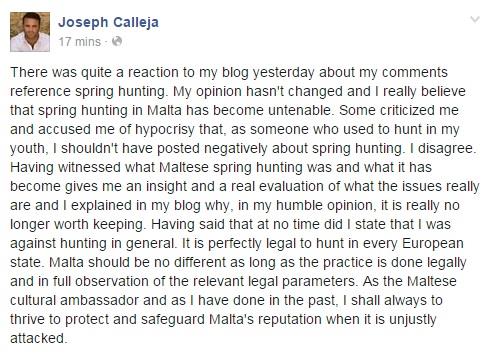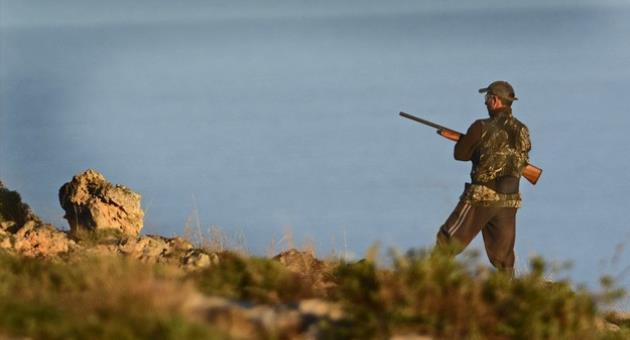Maltese tenor Joseph Calleja stopped hunting some 14 years ago for the same reasons he mentioned yesterday in his blog - the lack of space and habitat as a result of over development and the fact that quail and turtledoves (the only two species hunters are allowed to shoot in spring) do not fly over Malta in the same numbers they used to.
Mr Calleja yesterday said he believed that spring hunting is no longer tenable. His statement was welcomed by the SHout - Spring Hunting Out campaign but some criticised the tenor because of his hunting past.
When contacted by The Malta Independent today, Mr Calleja said: "It is no secret that I was taken hunting as a kid by a member of my family and that I enjoyed it in my youth - hence my insight about the issue. I have stopped hunting in Malta around 14 years ago exactly because of the issues mentioned in my blog." Mr Calleja also added that he had "never ever" hunted abroad.
Speaking to this newsroom, the tenor said he was not against spring hunting as such but things have changed over the years - huntable species populations have declined, habitats were destroyed and public spaces became smaller. That is why he believes that spring hunting is not tenable.
On the other hand he recalled that he had spoken against the "unfair portrayal" of Malta in a hunting feature on German TV station RTL.

Mr Calleja later uploaded the above post on Facebook.
In a blog published on his personal website yesterday, Mr Calleja did emphasise that the extent of illegal hunting in Malta has been exaggerated overseas, to the detriment of Malta's reputation. "There is of course a degree of illegal hunting in Malta, just like in any other country in the world where hunting takes place. This is deplorable and the perpetrators should be prosecuted to the full extent of the law but to say that we somehow effect worldwide bird population or that millions of bird killings takes place in Malta is not only hyperbole and preposterous but it is a downright lie," Mr Calleja wrote. He argued that Malta's small size made it ideal to monitor and document illegalities, in contrast with larger countries with vast hunting grounds away from it all.
"Of course the majority of hunters are law abiding citizens and a lot of unfair reputational damage has been done to the Maltese islands internationally by overzealous individuals and organisations who, quite frankly, should know better," Mr Calleja maintained.
However, he then stressed that he was neither defending illegal hunting nor hunting in spring. "I think that spring hunting in Malta is no longer tenable but not because of pseudo massacres but because of something simpler; space or lack thereof. Malta's overdevelopment has done exponentially more harm to birds and nature in general than any hunting whether illegal or not," Mr Calleja wrote. "It is absolutely fine by me if someone one wants to shoot his own dinner whilst fully observing the country's laws and regulations and without being nuisance to others. In Malta, unfortunately, one cannot do this because there isn't simply enough countryside to go around and the want (and need) of the majority to enjoy open spaces without shotguns lying around will always win."

He also pointed out that the two legally huntable species - quail and turtledove - do not fly over Malta in the numbers that they used to, while an increase has been recorded in other migratory species that "are just a joy to watch in spring."
"Quite frankly we could make it just a tad easier for these birds without them having to deal with lead flying around and loud bangs around their roosting areas. Let's remember that spring hunting in Malta became a tradition when the amounts of quail and turtle doves was simply gargantuan and when Malta enjoyed much larger rural areas with a smaller population. This is no longer the case and perhaps those defending the tradition of spring hunting need to come to terms with the changes that took place over the years," Mr Calleja said.
"The referendum this coming April will decide matters one way or the other and whilst I do feel for the bonafide and responsible hunters perhaps it is indeed the time for change. It might be a classic case that the game ain't worth the candle anymore."